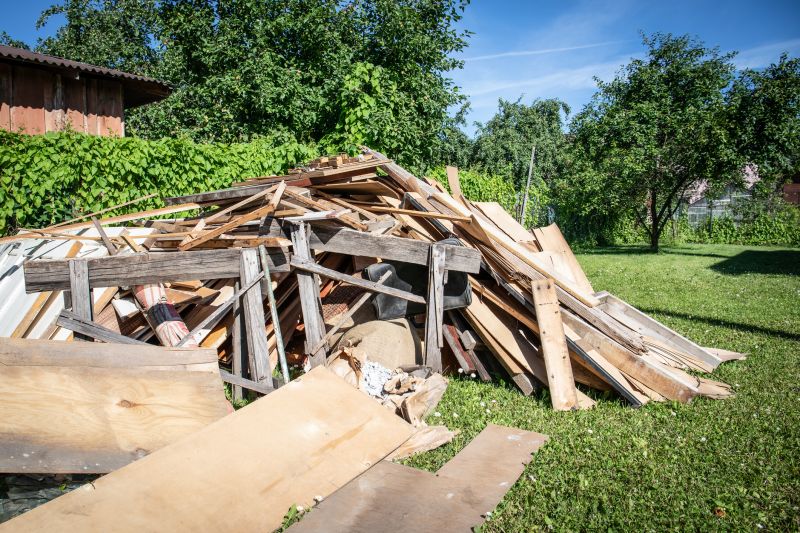Ultimate Guide To Shed Removal Products For Easy Demolition
Learn about the essential equipment and accessories that can streamline your shed removal and save you time and effort.
 Removing a shed can be a complex task that requires careful planning and the right tools to ensure safety and efficiency. The process often involves dismantling the structure, managing debris, and possibly preparing the site for new construction or landscaping. Having the appropriate products on hand can make each step smoother, reducing the risk of injury and minimizing property damage. Whether you're dealing with a small backyard shed or a larger storage unit, selecting suitable removal equipment is essential.
Removing a shed can be a complex task that requires careful planning and the right tools to ensure safety and efficiency. The process often involves dismantling the structure, managing debris, and possibly preparing the site for new construction or landscaping. Having the appropriate products on hand can make each step smoother, reducing the risk of injury and minimizing property damage. Whether you're dealing with a small backyard shed or a larger storage unit, selecting suitable removal equipment is essential.
Top Overall Option
Heavy-Duty Demolition Hammer
A heavy-duty demolition hammer offers powerful impact force suitable for breaking apart shed foundations, walls, and framing. Its versatility allows for efficient dismantling of various materials, including wood, concrete, and metal. When paired with appropriate safety gear, it can significantly reduce manual labor and improve safety during removal projects.
Types of Products For Shed Removals
Crowbar or Pry Bar
Essential for prying apart panels and lifting nails, facilitating manual dismantling of shed components.
Hammer
Useful for knocking apart wooden structures and removing nails or fasteners.
Power Saw
Ideal for cutting through wood, metal, or plastic panels during disassembly.
Reciprocating Saw
A versatile tool for quickly cutting through various materials in tight spaces.
Wheelbarrow or Dump Cart
Helps in transporting debris away from the site efficiently.
Heavy-Duty Gloves
Protects hands from splinters, nails, and sharp edges during dismantling.
Safety Goggles
Protects eyes from dust, debris, and flying particles during demolition.
Dust Mask or Respirator
Helps prevent inhalation of dust and particles released during removal.
Lifting Straps or Slings
Assist in lifting heavy panels or sections safely with multiple workers.
Heavy Machinery (Mini Excavator or Skid Steer)
Suitable for large-scale shed removal, especially for concrete or heavy framing.
Nail Puller or Pry Bar
Facilitates removal of nails and fasteners from dismantled components.
Wheelbarrow or Debris Bag
Helps in collecting and transporting debris from the site.
Concrete Saw
Specialized for cutting through concrete slabs or foundations if necessary.
Hand Saw or Circular Saw
Useful for precise cuts in wooden shed components.
Utility Knife
For cutting sealants, caulking, or small sections of siding or trim.
Popular Choices
A cordless reciprocating saw is favored for its portability and versatility during shed demolition.
Popular for protecting hands during manual dismantling tasks.
Commonly used to ensure eye protection during removal activities.
Useful for removing fasteners and disassembling components efficiently.
A staple in manual shed dismantling for prying apart panels and framing.
Widely used for transporting debris from the removal site.
Popular for respiratory protection during dusty demolition work.
Frequently used for cutting sealants and trimming materials.
Commonly employed to remove nails from dismantled wood panels.
Often selected for making quick cuts through wooden components.
Popular for hand protection during manual labor.
Chosen for cutting through concrete slabs or foundations if needed.
Used to assist in lifting heavy panels safely with multiple workers.
Effective for collecting and removing large amounts of debris.
Trending for large-scale or heavy-duty shed removal projects.
Proper shed removal not only involves physical tools but also safety gear to protect against falling debris, sharp edges, or dust. Heavy-duty gloves, eye protection, and durable clothing are often necessary complements to mechanical tools. Additionally, considering the size and material of the shed can influence the choice of equipment, from manual tools for smaller structures to powered machinery for larger or more stubborn builds.
Planning ahead by understanding the different product options can help streamline the removal process. From basic hand tools to advanced demolition equipment, there is a wide range of products designed to tackle various shed removal challenges. Investing in quality tools can also improve the overall safety and effectiveness of the project, making it easier to complete the task with confidence.
Ultimately, successful shed removal depends on selecting the right combination of tools and safety measures tailored to your specific project. Detailed preparation, understanding your options, and using appropriate safety gear can contribute significantly to a smooth, efficient, and safe removal process.
Key Buying Considerations
- Assess the size and material of the shed to determine appropriate tools and equipment.
- Consider safety gear such as gloves, goggles, and masks to protect against debris and dust.
- Evaluate whether manual tools or powered machinery best suits the scale of your project.
- Check the power source compatibility for cordless versus corded tools.
- Ensure the availability of replacement parts and blades for tools like saws and drills.
- Think about the accessibility of the shed and whether specialized equipment is needed for tight spaces.
- Determine the weight and maneuverability of larger machinery if opting for heavy equipment.
- Review the noise levels of powered tools, especially if working in noise-sensitive environments.
- Consider the disposal or recycling options for debris generated during removal.
- Plan for sufficient workspace and safety zones around the removal site.
- Evaluate the durability and quality of tools to ensure they withstand the demands of demolition.
- Look into rental options for high-cost machinery if the project is temporary.
- Assess your experience level with power tools and machinery to choose appropriate equipment.
- Factor in time constraints and project deadlines when selecting tools and equipment.
- Research local regulations or permits that may be required for demolition activities.
